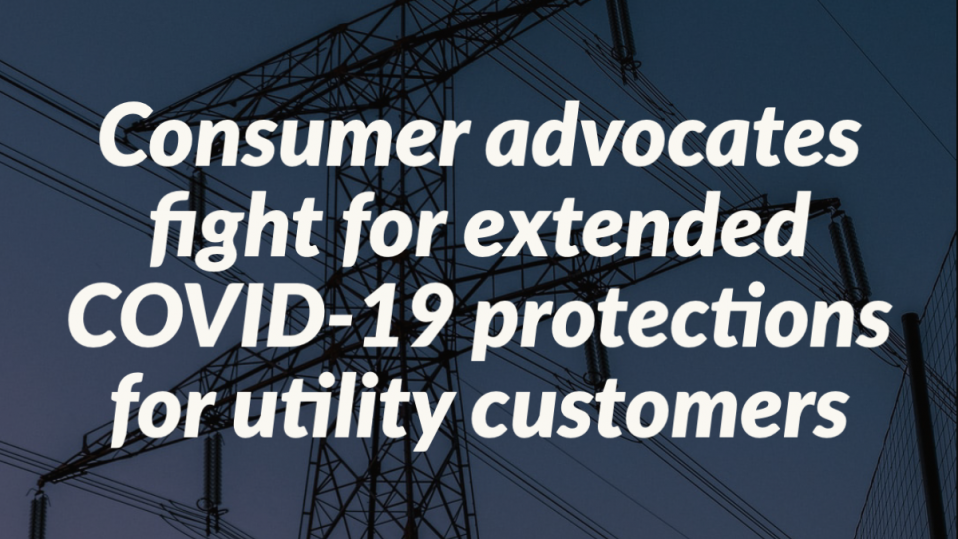After a historic agreement between consumer advocates and Illinois’ major utilities, state regulators are now considering the most comprehensive COVID-19 utility relief measures in the country. This plan could serve as a national model for helping utility customers struggling to pay their bills during the worst economic crisis since the Great Depression.
The relief plan is expected to be approved next week by the Illinois Commerce Commission (ICC). In addition to extending the halt on utility shut-offs and late fees through the summer, consumer advocates say the negotiated plan also reconnects customers without slapping them with fees, provides longer payment plans, and offers bill-payment assistance to help people catch up on their bills as Illinois begins recovery from the COVID-19 pandemic.
“We talk to utility customers every day, so we know people are hurting and worried about their bills,” said CUB General Counsel Julie Soderna. “It was a lot of work to get the utilities and consumer advocates to agree on a plan, but it had to be done to prevent the possibility of mass disconnections in the months ahead. Of course, there’s more work to do to help Illinois families get back on their feet, but this plan is a huge step forward.”
In March, on the heels of Gov. J.B. Pritzker’s emergency stay-at-home directive, the ICC ordered a moratorium on service shut-offs and late-payment fees for all of Illinois’ private, investor-owned utilities. At the same time, state regulators launched a process in which the utilities and advocates would set up a recovery plan for utility customers.
The resulting 30-page agreement includes these consumer protections for customers of Ameren Illinois, Aqua Illinois, ComEd, Illinois American Water, Nicor Gas, North Shore Gas, Peoples Gas and Utilities Inc.:
- Extension of the ICC moratorium on shut-offs and late-payment fees until about September 1, 2020.
- Reconnection without fee of all financially strapped utility customers disconnected in the last year for nonpayment until about February 1, 2021.
- A bill-payment assistance program that offers debt forgiveness for utility customers facing financial hardship.
- Until about February 1, 2021, utilities are required to offer extended consumer-friendly Deferred Payment Arrangements (DPAs)—utility payment plans that help customers pay off utility debt with no down payment. DPAs for customers who express financial hardship will not require a down payment and will be extended to 24 months. All other customers will be charged a down payment of no more than 10% of their arrearage, and may select periods up to 18 months to pay it off. (Typically, such plans are no more than 12 months.)
- The agreement will allow verbal expressions of financial hardship to remove barriers to accessing these protections. No documentation will be required.
- Utilities will be required to waive deposits connected to late or nonpayment, arrearages, or credit-related issues for residential customers experiencing financial hardship until about February 1, 2021. All other customers will get this benefit until the end of September.
- Until about February 1, 2021, utilities will not report late payments and nonpayment for active customers to credit bureaus and reporting agencies.
- Required utility reporting of disconnections and other credit and collections data, by zip code, through August of 2021. Consumer advocates lauded the data-collection requirements, saying they will provide valuable information about which neighborhoods and communities are being hit the hardest by utility bills and collection procedures.
Utilities have also been discussing how to improve the affordability of utility service for low-income consumers. That would include discussing a low-income discount as well as arrearage-reduction programs. It also would examine how to improve the effectiveness of the Percentage of Income Payment Plan (PIPP) and to protect its funding from being swept and used for other purposes in the state budget process. The PIPP, a program supported by consumer advocates, gives assistance to fixed-income consumers as long as they consistently pay a percentage of their energy bill.
The plan was negotiated by Illinois Attorney General Kwame Raoul’s office; Chicago Mayor Lori Lightfoot’s office; Community Organizing and Family Issues (COFI), represented by the National Consumer Law Center; the Legal Aid Society of Metropolitan Family Services; Allen Cherry, a longtime advocate for low-income utility customers in Illinois; and CUB.


